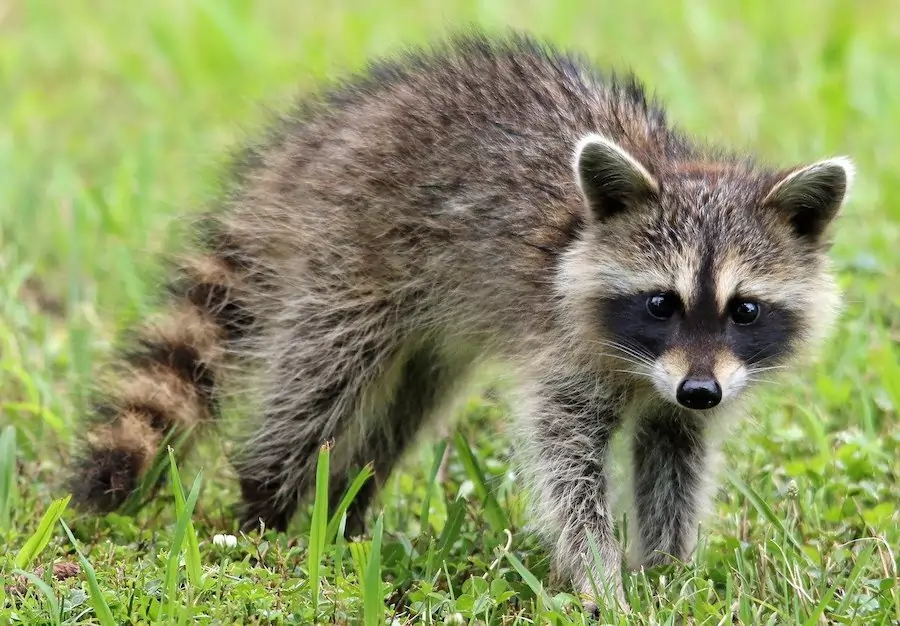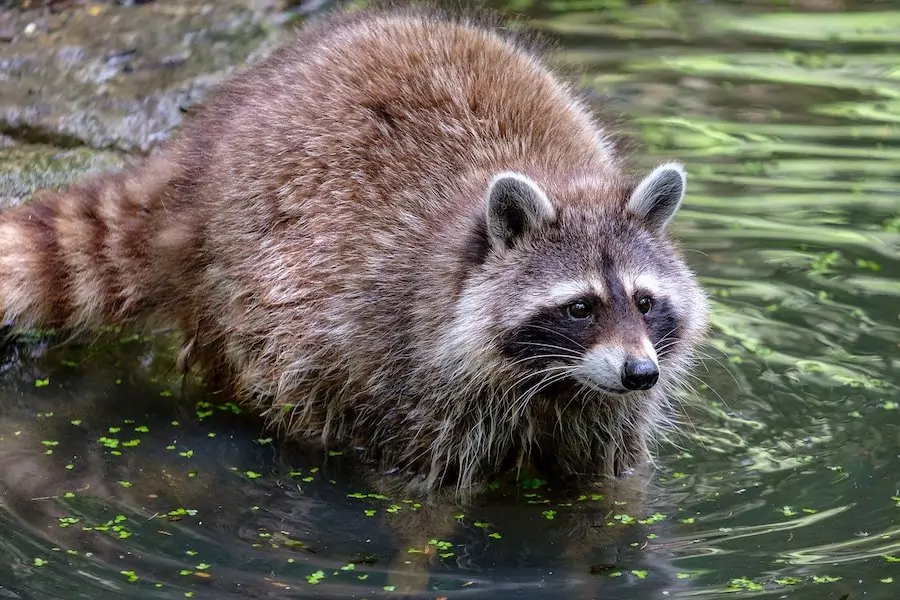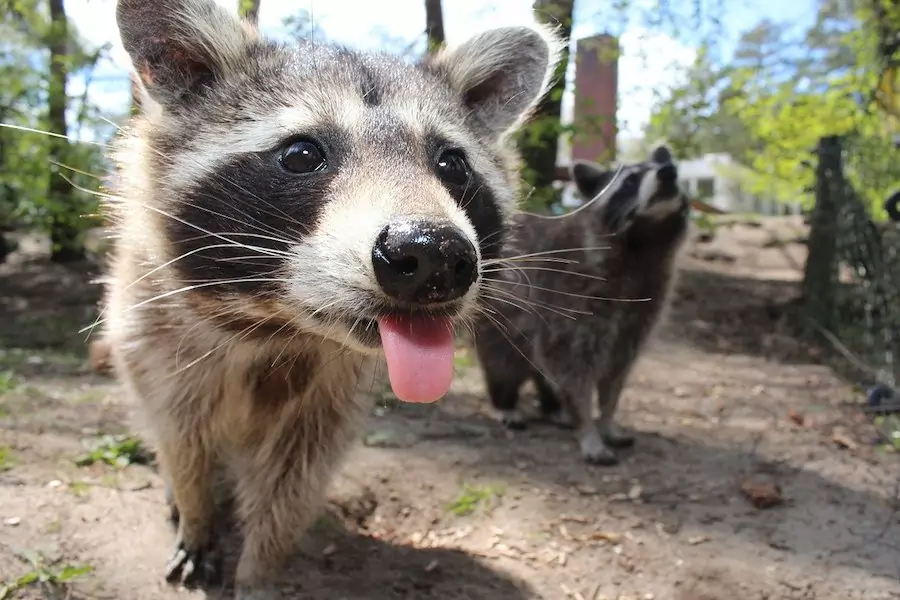Raccoons are seemingly cuddly creatures, portrayed in many TV episodes and films. But exactly how many facts about Raccoons do you know?
We’ve dived into the world of raccoons in order to bring you what we consider the top 15 facts about raccoons.
Facts About Raccoons
Raccoons are medium-sized mammals, known for some unique characteristics. That’s what we’ll go into here. So here’s our ultimate list of facts about raccoons.
1. One of the most common mammals in North America
Of the 457 species of mammals known to reside in North America, the deer mouse is reportedly the most common. Raccoons are certainly high up on the list.
Just because you may not see them that often does not mean they’re not everywhere!
But they’re not just limited to North America.
Raccoons were, in fact, exported to Europe to be reared in fur farms in the 1920s.
As you might expect, raccoons eventually escaped and inevitably began breeding in the wild. Even today raccoons in Europe are considered an invasive species and treated with disdain!
During the 1970s, kids in Japan demanded cuddly raccoons as pets after the fame of a popular cartoon character.
So naturally, they were shipped over … to the tune of 1500 per month. Once families realized they were truly wild animals and clearly very difficult to handle, they released them into the wild.
Despite imports and ownership being banned, raccoons now thrive in most areas of Japan.
The reason they were hard to handle might be due to our next fact…

2. Clever, and crafty facts about raccoons
Raccoons are highly intelligent, according to a number of studies. Vanderbilt University researchers discovered that raccoons have an average of 438 million neurons in a small brain, placing them near the top of the mammal intellect scale.
The scientists noted that if brain size and neuron count were taken into account, raccoons would fall under the category equating to small primates, and certainly at the higher level of mammal intelligence.
Problem solvers
Particularly city raccoons, who must figure out how to open cans of garbage, raid birdfeeders and snatch food from pet dishes, are crafty and persistent in their efforts.
They have even learned how to activate doorknobs, and gate catches with their paws.
3. Raccoons are performers
When raccoons are caught raiding, they often put on a “performance”
Raccoons that are caught in the act of raiding often give an elaborate show, complete with feigned innocence, outraged cries, and posturing.
4. Raccoon babies are called “kits”
Baby raccoons are born in late spring and early summer, after a period of about 63 days gestation.
They are born blind and helpless and stay with their mother for the first few months of their lives before striking out on their own.
A group of raccoon babies is called a “nursery.” A collective group of Raccoons can also be called a “gaze”.
5. Raccoons are bandits
Raccoons are often referred to as “backyard bandits” or “masked bandits”. Because they are curious and will investigate anywhere during their search for food.
It refers of course, to the black “mask” around their eyes which makes them look suspiciously like robbers and bandits!
6. Excellent sense of touch
The paws of raccoons are extremely sensitive, which is why they are able to handle food with such precision. Surprisingly their hands have five digits which help in handling all kinds of materials.
In fact, their name is derived from their sense of touch which was first noticed by Native Americans.
The English word for “raccoon” is derived from the Powhatan word aroughcun, which loosely translates to “The animal who rubs, scrubs and scratches with its hands.”
The Aztecs also focussed on this when they named the raccoon. calling it mapachitli, meaning “one who takes everything in its hands.”
They can identify objects in rushing or mirky water simply by touch. And it’s believed their sense of touch is also heightened when their paws are immersed in water.
They also have extremely sensitive whiskers on their face, which helps them to navigate in the dark and to find food.
This brings us nicely on to fact number 7…

7. Highly dexterous
Raccoons have very dexterous and nimble paws, which they use to forage for food in the wild.
Their hands are also great for climbing trees and getting into tight spots.
The claws on their paws are also very sharp, and they can use them to defend themselves against predators or to tear through food, and grip trees.
8. Raccoons are expert climbers
Raccoons are great climbers, and they often climb trees in search of food or shelter.
They have a lot of strength in their hind legs, which they use to propel themselves up the tree trunk. The sharp claws we mentioned also help them to grip the tree bark.
In addition to their climbing skills, raccoons are also great swimmers and can stay submerged underwater for up to 3 minutes!
9. Raccoon are larger than you might think
If you’ve never seen a raccoon up close before you may be surprised by their size. Raccoons can be up to 3 feet long and can weigh up to 30 pounds.
Typically though, they average around 20 lbs in weight. But that’s still quite a lot!
10. The wide raccoon diet
Raccoons are omnivores, which means they eat both meat and plants.
They are opportunistic feeders, and they will eat just about anything they can find. This includes insects, small rodents, fruits, nuts, and even your garbage!
11. Raccoons are nocturnal
Raccoons are mostly nocturnal animals, which means they are most active at night.
During the day they tend to hide in trees or other sheltered areas, to avoid being seen by predators or humans and because it’s cooler.
This might be why you rarely see them.
12. Raccoons can be a nuisance
Raccoons can become a nuisance when they start raiding people’s garbage cans or pet food bowls.
They’re not classed as vermin but are considered to be pests simply because they can be aggressive, and may pose a threat to a person’s safety. While they may offer some benefits to your backyard, like most pests, this is outweighed by their usual pattern of creating damage.
Another reason why you might want to stay clear is because of fact number 13…

13. Raccoons can carry diseases
Raccoons in the United States are known to carry a variety of diseases, including rabies, leptospirosis, and roundworm.
It’s important to keep your distance from raccoons and to never handle them if you see one out in the wild. avoid contact, and cautiously remove their feces.
14. Raccoon lifespan
The average raccoon lifespan in the wild is around 2-3 years, but they can live up to 10-12 years in captivity.
But in fact, they would generally live up to around 5 years. their time is shortened mostly due to predators, disease, and human interaction.
Natural predators include cougars, coyotes, and bobcats. Kills from road traffic are also a major threat to Raccoon’s survival rates.
Despite this, among the seven different species, only one is considered “critically endangered”. That being the pygmy raccoon.
15. Raccoons have a good memory
Research has shown that raccoons have a good memory and can remember where they’ve stashed their food up to 18 months later.
This is why it’s important to never feed raccoons, as they will start to rely on humans for their food and not only lose their natural ability to hunt for themselves, but also their natural fear of us.
That’s the facts about raccoons… want more facts?
Raccoons are interesting creatures and, while they may seem like naughty creatures at times, and quite cuddy animals, they also still deserve our respect.
With these facts in mind, you’ll now be better equipped to handle any raccoon or impress others with your knowledge.
Be sure to check out these related articles
